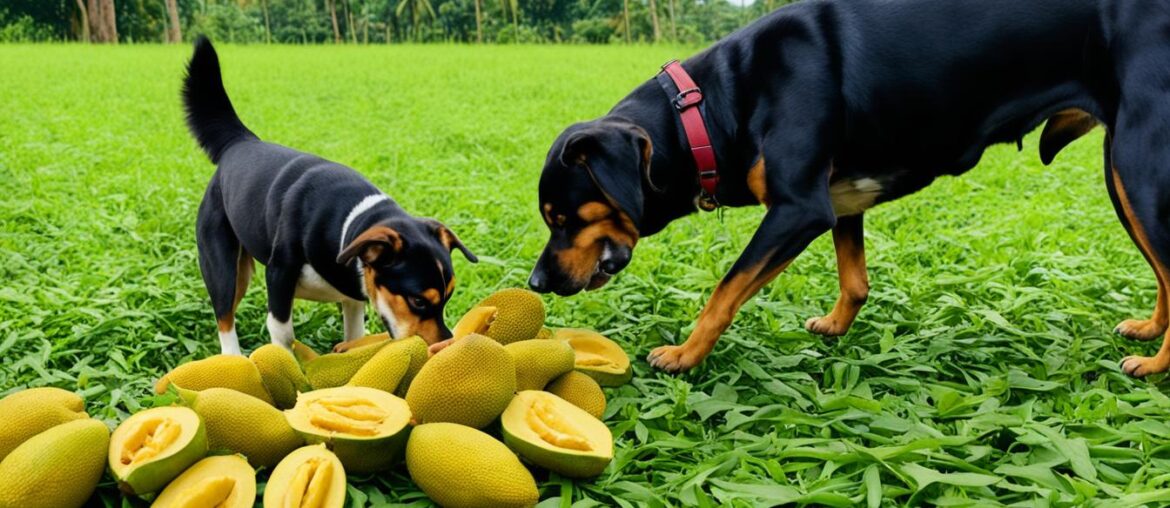Jackfruit is a relatively new food in the West and has gained popularity as a meat substitute in recent years. However, there is limited information on whether jackfruit is safe for dogs. It is important to understand the implications of feeding jackfruit to our furry friends before incorporating it into their diet.
Key Takeaways:
- Consult with a veterinarian before feeding jackfruit to your dog.
- Feed dogs only the fleshy part of the fruit, avoiding the seeds and skin.
- Monitor dogs for any signs of allergic reactions or digestive issues after consuming jackfruit.
- Avoid giving dogs cooked jackfruit with toxic ingredients like garlic or onions.
- Dogs should never eat jackfruit seeds as they can be toxic and pose a choking hazard.
Can Dogs Eat Jackfruit?
Dogs can eat jackfruit, but it is important to exercise caution and follow certain guidelines. While there is no definitive scientific research on the safety of jackfruit for dogs, anecdotal evidence suggests that it is generally safe. However, it is crucial to only give dogs the fleshy part of the fruit and avoid the seeds and skin.
Jackfruit is a tropical fruit that belongs to the mulberry family. It has a unique taste and texture, making it an interesting addition to a dog’s diet. Here are some key points to consider when feeding jackfruit to your furry friend:
- Give it in moderation: Like any new food, it is important to introduce jackfruit slowly and in small portions. This allows you to monitor your dog’s reaction and ensure they don’t have any adverse effects.
- Avoid seeds and skin: Jackfruit seeds are not safe for dogs to consume as they can be a choking hazard and may contain toxic substances. Additionally, the skin is tough and difficult to digest.
- Watch for allergic reactions: While rare, some dogs may have allergies to jackfruit. It is recommended to observe your dog for any signs of allergic reactions, such as itching, hives, or gastrointestinal distress. If any adverse symptoms occur, discontinue feeding jackfruit immediately and consult with a veterinarian.
If you decide to incorporate jackfruit into your dog’s diet, it is essential to use fresh, ripe fruit. The fleshy part of the fruit, known as the pulp, is the safest and most nutritious part for dogs to consume.
The Nutritional Value of Jackfruit for Dogs
Jackfruit is a good source of various nutrients that can benefit dogs. It contains essential vitamins, minerals, and fiber. Here is a breakdown of the nutritional value of jackfruit pulp for dogs:
| Nutrient | Amount per 100g |
|---|---|
| Protein | 1.7g |
| Fat | 0.6g |
| Carbohydrates | 23.5g |
| Dietary Fiber | 1.7g |
| Vitamin C | 9.1mg |
| Vitamin A | 110 IU |
Jackfruit is a great source of dietary fiber and can aid in promoting healthy digestion in dogs. It also contains a moderate amount of carbohydrates, which can provide energy. However, it is important to remember that jackfruit is relatively high in sugar, so it should be given in moderation.
Always consult with your veterinarian before making any changes to your dog’s diet, including introducing new fruits or vegetables like jackfruit. They can provide personalized advice based on your dog’s specific needs and health condition.
Can Dogs Eat Cooked Jackfruit?
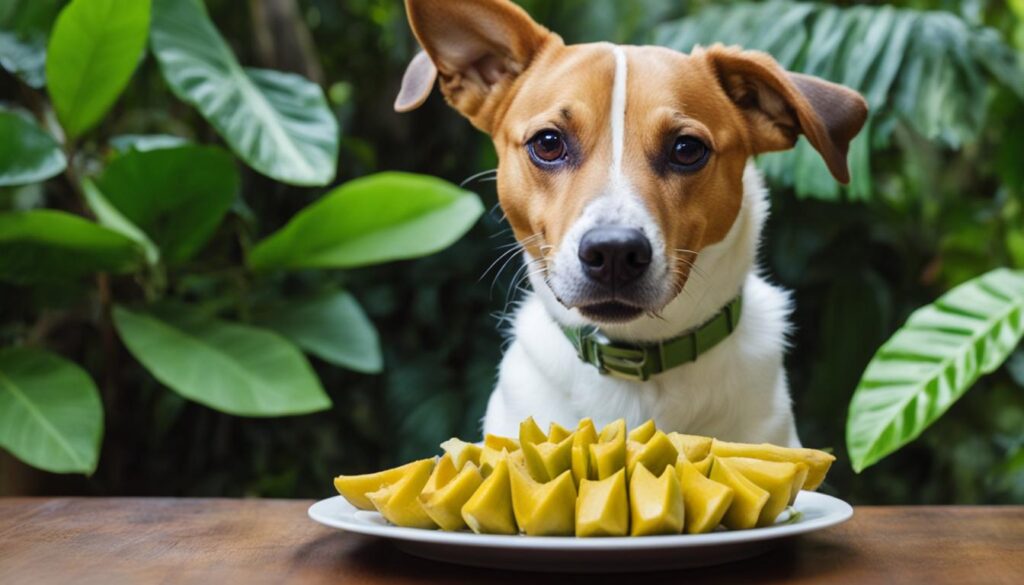
When it comes to feeding our furry friends, it’s essential to be cautious and informed about what foods are safe for them. Cooked jackfruit is a popular food among humans, but is it safe for dogs to consume? Let’s find out.
There is no evidence to suggest that cooked jackfruit is unsafe for dogs. In fact, many pet owners have included cooked jackfruit in their dogs’ diets without any reported issues. However, there are a few important considerations to keep in mind when feeding cooked jackfruit to your canine companion.
Firstly, it’s crucial to ensure that the cooked jackfruit does not contain any toxic ingredients for dogs. Foods like garlic and onions can be harmful to dogs and should never be included in their meals. Additionally, any spices or seasonings used in the cooking process should be safe for canine consumption.
While cooked jackfruit may be safe for dogs, it’s always recommended to consult with a veterinarian before introducing any new food into your dog’s diet. They can provide personalized advice based on your dog’s specific dietary needs and health conditions.
Feeding your dog cooked jackfruit can be a healthy and nutritious addition to their diet, as long as it is prepared and served correctly. Remember to always prioritize your dog’s well-being and consult with a professional to ensure their safety.
Can Dogs Eat Dried Jackfruit?
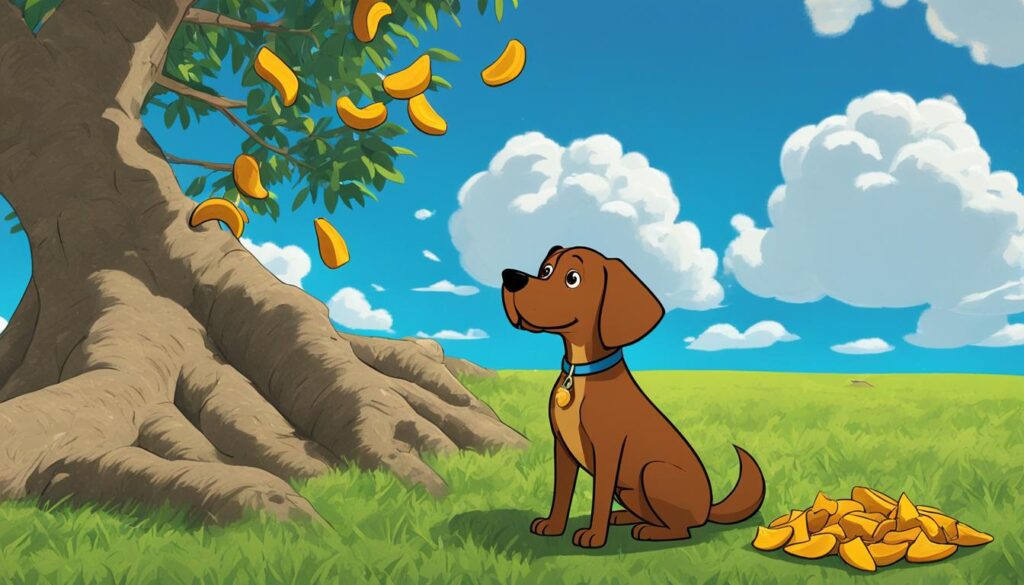
Dried jackfruit can be a fun and tasty treat for dogs, but it’s important to consider certain factors before feeding it to them. While dried jackfruit itself is not toxic to dogs, it’s essential to be mindful of the high sugar content in this dried fruit. Excessive sugar intake can lead to weight gain, dental issues, and potential blood sugar problems in dogs.
If your furry friend accidentally gets a hold of dried jackfruit, it’s crucial to keep an eye out for any signs of allergic reactions or digestive issues. Some dogs may have sensitivities or intolerances to certain fruits, including dried jackfruit. If you notice any symptoms such as vomiting, diarrhea, or excessive itching, it’s best to consult with a veterinarian for guidance.
To better understand the nutritional value of dried jackfruit, let’s take a closer look at the composition of this delicious snack:
| Nutrient | Amount per 100g |
|---|---|
| Calories | 314 |
| Carbohydrates | 81.7g |
| Fiber | 6.7g |
| Sugar | 66.4g |
| Fat | 0.6g |
| Protein | 2.8g |
While dried jackfruit may offer some nutritional benefits, such as fiber, it is important to remember that dogs have different dietary needs and digestive capabilities compared to humans. It is always recommended to prioritize a balanced and appropriate diet specifically formulated for dogs and approved by a veterinarian.
Can Dogs Eat Jackfruit Chips?

Jackfruit chips can be a crunchy and delicious snack for dogs, providing them with a different taste and texture experience. However, it is important to choose the right kind of jackfruit chips that are safe for our furry friends.
When selecting jackfruit chips for dogs, it is essential to opt for chips that are made without any spices, seasonings, or additives that could potentially upset their stomachs. Most commercially available jackfruit chips are made with just the fruit and oil, making them a safer option for dogs.
While jackfruit chips can be an enjoyable treat, it is still crucial to feed them to dogs in moderation. Too many chips can lead to weight gain and other health issues. As with any new food, it is recommended to introduce jackfruit chips gradually into your dog’s diet and monitor their reaction.
“Jackfruit chips can be a healthy and tasty alternative to conventional dog treats. However, it is important to ensure that the chips are made with minimal ingredients, without any added spices or seasonings.”
As responsible pet owners, we need to observe our dogs for any adverse reactions after they consume jackfruit chips. If you notice any signs of digestive issues, allergies, or discomfort, it is crucial to consult your veterinarian.
Remember, every dog is unique, and their dietary needs may vary. It is always best to consult with your veterinarian before introducing new foods, including jackfruit chips, into your dog’s diet. They can provide personalized advice based on your dog’s specific needs and health conditions.
Can Dogs Eat Jackfruit Meat?
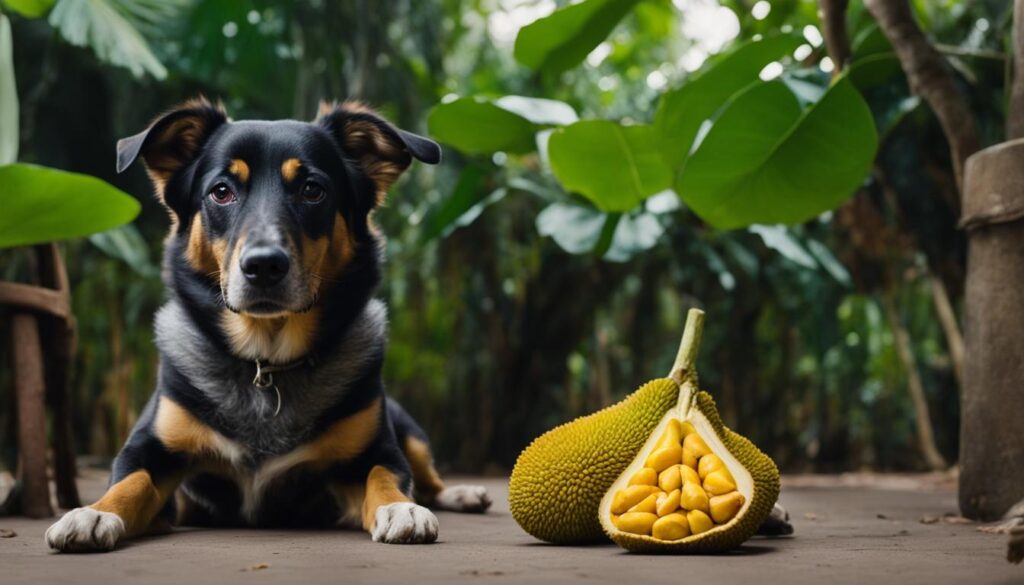
Jackfruit meat, which refers to the fleshy part of the fruit, is generally safe for dogs to eat. It can be a healthy and nutritious addition to their diet. However, there are a few important considerations to keep in mind when feeding jackfruit meat to dogs.
Removing the Latex
Before giving jackfruit meat to dogs, it’s crucial to remove the white sticky substance known as latex. This is especially important if your dog has a skin allergy or sensitivity. The latex can cause irritation or an allergic reaction in some dogs, so it’s best to remove it to avoid any potential issues.
Feeding Only the Flesh
When offering jackfruit meat to dogs, it’s essential to give them only the flesh or meat of the fruit. The skin and seeds should be avoided, as they can be difficult for dogs to digest and may cause digestive issues. Additionally, the seeds of jackfruit are toxic to dogs and can be a choking hazard, so they should never be given to them.
It’s also important to note that any spices or seasonings should be avoided when feeding jackfruit meat to dogs. While humans may enjoy jackfruit dishes with added flavors, these seasonings can be harmful to dogs, causing digestive upset or allergic reactions.
As always, it’s crucial to monitor your dog after introducing any new food into their diet. Watch for any signs of allergic reactions, such as itching, swelling, or difficulty breathing. If you notice any adverse reactions, consult with your veterinarian for guidance.
Overall, when given in moderation and prepared properly, jackfruit meat can be a safe and nutritious treat for dogs. It’s always best to consult with your veterinarian to ensure it aligns with your dog’s specific dietary needs and any existing health conditions.
Can Dogs Eat Jackfruit Seeds?

Jackfruit seeds are not safe for dogs to eat and should be avoided. These seeds are toxic to dogs and can pose a choking hazard. They contain a cyanide-like substance that is harmful to their health. While there may be limited research on the specific toxicity of jackfruit seeds to dogs, it is best to err on the side of caution and keep dogs away from them.
If a dog accidentally consumes jackfruit seeds, it is important to monitor them closely for any signs of distress or adverse reactions. Seek immediate veterinary attention if necessary.
Why Are Jackfruit Seeds Dangerous for Dogs?
Jackfruit seeds contain a toxic compound that is similar to cyanide. This substance can cause severe health issues for dogs if ingested, including poisoning and potential organ damage. In addition to being toxic, the seeds can also be a choking hazard due to their size and texture.
“Jackfruit seeds are not safe for dogs. It is important to keep them away from dogs to prevent any potential harm or health complications.” – Dr. Sarah Thompson, Veterinarian
Is Jackfruit Good For Dogs?
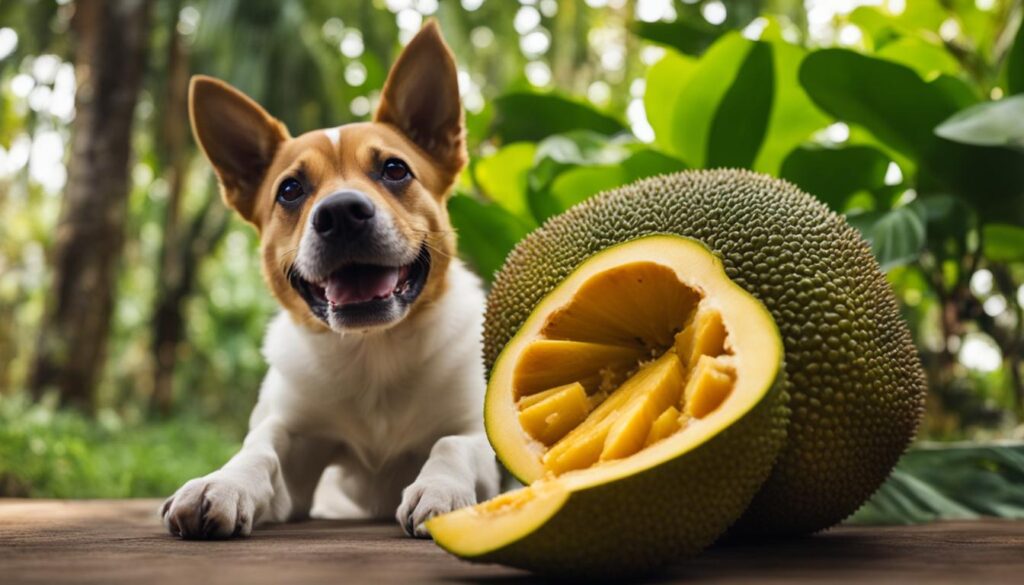
While jackfruit is known for its potential health benefits in humans, there is limited research on whether it is beneficial for dogs. Jackfruit is high in sugar, fiber, and water, and it contains vitamin A and C. However, it is important to monitor dogs for any signs of digestive issues or allergic reactions when introducing jackfruit into their diet.
The Benefits of Feeding Dogs Jackfruit
Jackfruit offers several potential benefits for dogs due to its nutritional value:
- High in fiber: Jackfruit is rich in fiber, which can aid in digestive health and promote regular bowel movements in dogs.
- Source of vitamins: Jackfruit contains vitamin A and C, which are important for maintaining a healthy immune system and overall well-being in dogs.
- Hydrating properties: The high water content in jackfruit can help keep dogs hydrated, especially during hot weather or after physical activity.
Introducing Jackfruit to Your Dog’s Diet
When introducing jackfruit into your dog’s diet, it is essential to take the following precautions:
- Start with small quantities: Begin by offering a small amount of jackfruit to observe how your dog reacts. If there are no adverse reactions, you can gradually increase the portion size.
- Monitor for allergies: Keep a close eye on your dog for any signs of allergic reactions, such as itching, rashes, or digestive discomfort. If any adverse symptoms occur, discontinue feeding jackfruit and consult with a veterinarian.
- Prepare properly: Only offer the fleshy part of the jackfruit to your dog, avoiding the seeds, skin, and any seasoning or spices. Remove the white latex-like substance on the fruit’s surface, as it may cause irritation or allergies in sensitive dogs.
While jackfruit may have potential benefits for dogs, it should be fed in moderation as part of a balanced diet. It is always recommended to consult with a veterinarian before making any significant changes to your dog’s diet to ensure their specific nutritional needs are met.
Final Thoughts
While there is no definitive answer on whether dogs can safely consume jackfruit, the limited evidence suggests that it can be safe for them in moderation. However, it is crucial to consult with a veterinarian before introducing any new food into your dog’s diet, including jackfruit. Each dog is unique, and it is important to consider their individual health and dietary needs.
When feeding jackfruit to dogs, it is essential to monitor them for any signs of allergic reactions or digestive issues. Some dogs may be more sensitive to certain foods, including fruits like jackfruit. If you notice any symptoms such as vomiting, diarrhea, or changes in behavior after feeding your dog jackfruit, discontinue feeding it and consult with a veterinarian.
While jackfruit does offer some potential health benefits, such as being high in fiber and certain vitamins, it is not a necessary or essential part of a dog’s diet. Dogs have different nutritional requirements than humans, and their diet should primarily consist of a balanced and complete commercial dog food that meets their specific needs.
“Feeding jackfruit to dogs should always be approached with caution. While it can be safe for some dogs, it is important to remember that dogs are carnivores and have different dietary needs than humans. It is best to consult with a veterinarian for professional advice on what is suitable for your dog’s diet.” – Dr. Emily Anderson, DVM
Remember, the well-being and health of your dog should always be the top priority. If you have any concerns or questions about feeding jackfruit to your dog, consult with a veterinarian who can provide tailored advice based on your dog’s specific needs and health conditions.
More Dog Food Resources
For more information on dog nutrition, dog food safety, and tips for creating a healthy diet for your furry friend, consult additional dog food resources. These resources can provide valuable insights and guidelines for feeding dogs a balanced and nutritious diet.
When it comes to dog nutrition, it’s important to understand the dietary needs of your canine companion. A well-balanced diet plays a crucial role in maintaining their overall health and well-being. From the proper ratio of protein to carbohydrates, to the right amount of vitamins and minerals, a healthy dog diet should meet all their nutritional requirements.
When selecting dog food, it’s crucial to prioritize their safety. Dog food safety encompasses factors such as proper storage, handling, and choosing reputable brands that follow strict quality control measures. By ensuring the safety of the food you feed your dog, you can prevent health issues and promote their longevity.
While dogs have a different digestive system than humans, they can enjoy certain fruits as part of their diet. Feeding dogs fruit should be done in moderation and with caution. Some fruits are safe and provide additional vitamins and antioxidants to their diet, such as apples, blueberries, and watermelon. However, it’s essential to avoid feeding them fruits that are toxic to dogs, like grapes and raisins.
Why Dog Nutrition is Important
Dog nutrition plays a fundamental role in their overall health and well-being. A healthy diet can support their immune system, promote proper growth and development, and prevent various health issues. By providing dogs with a balanced and nutritious diet, you can help them live a long and happy life.
When it comes to choosing dog food, it’s essential to read the labels and understand the ingredients. Look for high-quality proteins like chicken, beef, or fish as the main ingredient. Avoid dog foods that contain fillers, artificial additives, and excessive amounts of preservatives.
Additionally, consulting with a veterinarian can provide personalized guidance on your dog’s nutritional needs. Your vet can recommend the appropriate portion sizes, dietary adjustments for specific health conditions, and address any concerns or questions you may have about your dog’s diet.
| Resource | Description |
|---|---|
| American Kennel Club (AKC) | The AKC provides comprehensive information on dog nutrition, including articles, guides, and dietary recommendations for different breeds and life stages. |
| PetMD | PetMD offers a wide range of resources on dog nutrition, covering topics such as diet planning, ingredient analysis, and common dietary concerns. |
| American Society for the Prevention of Cruelty to Animals (ASPCA) | The ASPCA provides resources on pet nutrition, offering guidance on selecting high-quality dog food and understanding proper feeding practices. |
Wrapping Up
In conclusion, based on the available information, it seems that jackfruit is generally safe for dogs to consume. However, it is crucial to proceed with caution and closely monitor your furry friend for any adverse reactions or digestive issues. Before adding jackfruit or any new food to your dog’s diet, it is always recommended to consult with a veterinarian to ensure their safety and well-being.
While jackfruit is known for its potential health benefits and is a rich source of vitamins and fiber, it is essential to remember that each dog is unique and their dietary needs may vary. A veterinarian can provide personalized advice based on your dog’s specific conditions and requirements.
Feeding your dog a balanced and nutritious diet is essential for their overall health and well-being. While jackfruit can be included as an occasional treat, it should not replace a complete and balanced diet formulated for dogs. By carefully considering your dog’s individual needs and consulting with professionals, you can make informed decisions about their diet to help them thrive.
FAQ
Can dogs eat jackfruit?
Dogs can eat jackfruit in moderation. While there is limited scientific research on its safety for dogs, anecdotal evidence suggests it is generally safe. However, only give dogs the fleshy part of the fruit and not the seeds or skin. Monitor dogs for allergic reactions or digestive issues.
Can dogs eat cooked jackfruit?
There is no evidence to suggest that cooked jackfruit is unsafe for dogs. However, ensure that the cooked jackfruit does not contain any ingredients toxic to dogs, such as garlic or onions. Consult with a veterinarian before introducing it to your dog’s diet.
Can dogs eat dried jackfruit?
Dried jackfruit can be a fun treat for dogs, but be mindful of their sugar intake. Excessive sugar can lead to weight and blood sugar issues. Watch for signs of allergic reactions and consult a veterinarian if needed.
Can dogs eat jackfruit chips?
Jackfruit chips can be a crunchy treat for dogs, but choose chips made without spices or ingredients that could upset their stomachs. Most jackfruit chips are made with just the fruit and oil, making them a safer option. Monitor dogs for any adverse reactions.
Can dogs eat jackfruit meat?
Jackfruit meat, the fleshy part of the fruit, is generally safe for dogs to eat. However, remove the white sticky substance or latex before giving it to dogs, especially if they have a skin allergy or sensitivity. Avoid adding spices or seasonings.
Can dogs eat jackfruit seeds?
Dogs should never eat jackfruit seeds as they are toxic and can be a choking hazard. The seeds contain a harmful substance similar to cyanide. Keep dogs away from jackfruit seeds.
Is jackfruit good for dogs?
While there is limited research on the benefits of jackfruit for dogs, it is high in sugar, fiber, water, vitamin A, and C. Monitor dogs for any signs of digestive issues or allergic reactions when introducing jackfruit into their diet.
How do I ensure the safety of feeding jackfruit to my dog?
Consult with a veterinarian before introducing jackfruit or any new food to your dog’s diet. It is important to exercise caution and monitor dogs for any adverse reactions.
Where can I find more information on dog nutrition and food safety?
For more information on dog nutrition, dog food safety, and creating a healthy diet for your dog, consult additional dog food resources. These resources can provide valuable insights and guidelines.


